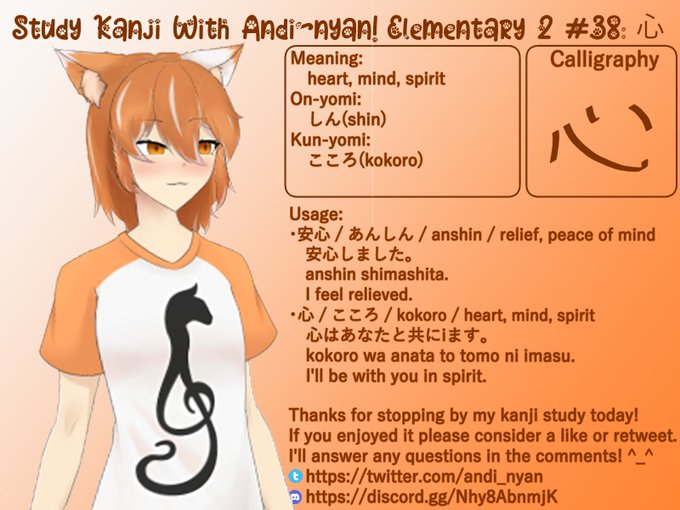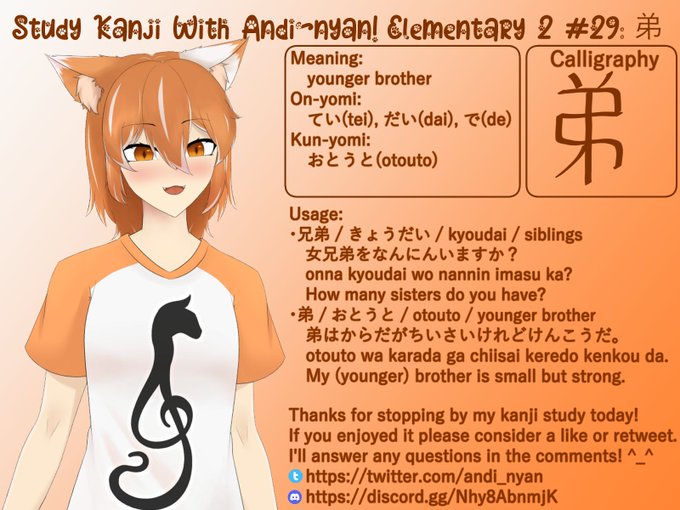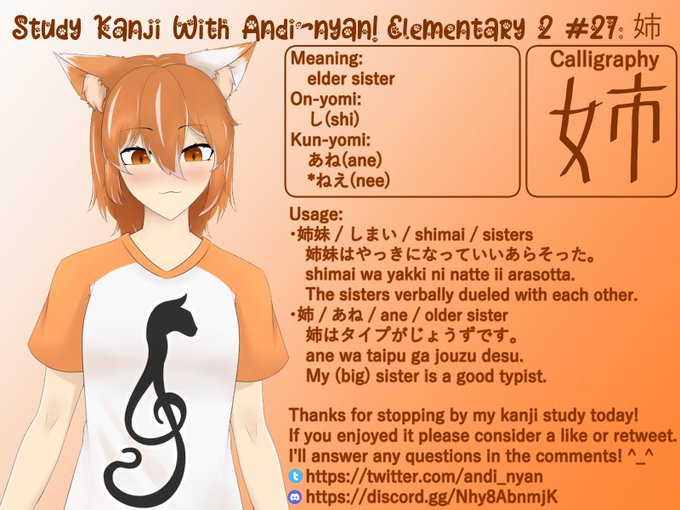kanjistudyのTwitterイラスト検索結果。 141 件中 5ページ目
ようこそ! Today's #kanjistudy is 夜, night!
Fun fact I learned - this originally referred more to "evening", but it's since become used for nighttime as well. Thus 夜食 is "late meal" rather than supper.
にゃりがとう! またにゃ!
#ENVtuber #VtuberTwP
ようこそ! Today's #kanjistudy is 昼, daytime/noon!
So you'll often hear 昼ごはん to refer to lunch in anime. I picked 昼食 because it's more formal - i.e., better to use with people you don't know well.
にゃりがとう! またにゃ!
#ENVtuber #VtuberTwP
ようこそ! My #kanjistudy today features 朝, morning!
The original concept for this kanji is the sun rising through vegetation while the moon is still visible. I found that to be pretty interesting when I learned it.
Thanks for stopping by, またにゃ!
#ENVtuber #VTuberTwP
ようこそ! I'm resuming my daily kanjistudy, and today features 曜, day of the week.
Many times this is translated "weekday", and it covers all the days of the week:
日曜 (Su)
月曜 (M)
火曜 (Tu)
水曜 (W)
木曜 (Th)
金曜 (F)
土曜 (Sa)
にゃりがとう! またにゃ!
#ENVtuber #VtuberTwP
Apologies for the delay. Here's my #kanjistudy for today: 時, time.
This kanji is probably the first where I recognized the meaning of the individual components and how they contribute. 日 (sun), 土 (ground), 寸 (measure) form a sundial.
にゃりがとう. ^_^
#ENVtuber #VtuberTwP
ようこそ to my #kanjistudy! Today features 心, heart!
Even though it doesn't look like it now, this kanji was originally drawn as an actual heart once upon a time.. ^_^
にゃりがとう、みんにゃ!またにゃ!
#ENVtuber #VTuberTwP
ようこそ! Today's #kanjistudy features 首, neck!
This kanji has actually diverged a bit from the original meaning. It was originally a side view of a head - hair on the top and the eye in the middle of the face. Very neat. ^_^
にゃりがとう、またにゃ!
#ENVtuber #VtuberTwP
ようこそ! Today's #kanjistudy is on 顔, face!
Apparently part of this kanji originally referred to the forehead, which is why it and 頭 share a component.
にゃりがとう! じゃまた!
#ENVtuber #VtuberTwP
ようこそ!
Today I'm featuring 頭, head, in my #kanjistudy.
This kanji is also used as a counter for large animals! Think like "heads" of cattle. I thought that was really interesting when I learned it.
にゃりがとう! I hope you're enjoying these. ^_^
#ENVtuber #VtuberTwP
ようこそ!
Today's #kanjistudy features 毛, hair/fur! It can also refer to feathers or down.
And that's a good way to remember this kanji - think of it as looking like a feather!
Thanks for visiting, and またにゃ!
#ENVtuber #VtuberTwP
ようこそ!
My #kanjistudy for today features 体, body.
I'm not quite sure why it incorporates the kanji for book, 本, though it looks like it might have been one of the less common meanings instead.
にゃりがとう、みんにゃ!またにゃ!
#ENvtuber #VtuberTwP
ようこそ to my #kanjistudy! Today I feature 友, friend.
The kanji itself depicts two hands, representing friendship. I think it's safe to say that they're clasped together, and this is an elegant way to show the concept. ^_^
Thanks for coming, and またね!
#ENVtuber #VTuberTwP
ようこそ! Today's #kanjistudy is 自, oneself!
Lots to unpack in this kanji - it's the concept of 'self'. It can mean yourself, myself, himself, herself, etc. Easy to remember, too, an eye 目 with a lash. Quite a useful kanji!
Thanks for visiting, またね!
#ENVtuber #VtuberTwP
ようこそ! My #kanjistudy for today features 妹, younger daughter!
Even though it's not actually the radical for tree, 木, I can't help but see this kanji as a girl who climbs trees. It helps me remember the kanji at least. ^_^
#ENVtuber #VtuberTwP
ようこそ!
Today's #kanjistudy features 弟, younger brother.
I found it interesting that there's no particular similarity between 兄 and 弟, and it turns out that 弟 originally meant something completely different.
にゃりがとう、みんにゃ! またにゃ!
#ENVtuber #VtuberTwP
Continuing with my #kanjistudy, here's the next in the sequence, 兄, or older brother!
Thankfully, this one is pretty memorable - a mouth (口) with a pair of legs attached. Do big brothers being talkative cross cultures?
Thanks for reading, またにゃ!
#ENVtuber #VTuberTwP
Welcome to my #kanjistudy! Today's is 姉, older sister.
There's a fairly easy way to remember this kanji - it has 女, female, and 市, market, so a girl who can go to the market by herself. ^_^
にゃりがとう、みんにゃ!またにゃ!
#ENVtuber #VtuberTwP
For today's #kanjistudy, I'm featuring 父, father!
Like with 母, you use ちち for your own father and とうさん for someone else's father. I'm not really sure why both kanji have this irregular reading, it's pretty neat!
Thanks for stopping by, またにゃ!
#ENVtuber #VtuberTwP
Hello and welcome to my #kanjistudy featuring 母, mother!
A couple notes here. はは is your own mother, while かあさん is someone else's mother. Also, the readings with * are not formally associated with 母.
にゃりがとう、みんにゃ!またにゃ!
#ENVtuber #VtuberTwP
Welcome to my #kanjistudy, today I'm featuring 親, parent!
I like how this uses 立, 木, 見 (stand, tree, see), and I remember it as "a child has to stand in a tree to look their parents in the eye".
にゃりがとう、みんにゃ!またにゃ!
#ENVtuber #VtuberTwP




















